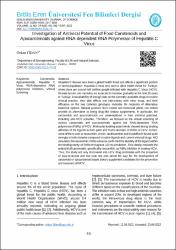| dc.contributor.author | Özkan, Fidan | |
| dc.date.accessioned | 2023-09-18T11:47:26Z | |
| dc.date.available | 2023-09-18T11:47:26Z | |
| dc.date.issued | 2022 | en_US |
| dc.identifier.issn | 2147-3129 | |
| dc.identifier.issn | 2147-3188 | |
| dc.identifier.uri | http://doi.org/10.17798/bitlisfen.1161170 | |
| dc.identifier.uri | https://hdl.handle.net/20.500.12573/1790 | |
| dc.description.abstract | Hepatitis C disease have been a global health threat and affects a significant portion of world population. Hepatitis C have also been a silent health threat for Turkiye, where there are around half million people infected with Hepatitis C Virus (HCV). Disease burden and mortality are expected to increase gradually in the next 20 years in Turkiye. Unavailability of enough data on the currently-available drugs in routine clinical practice, their side effects and interactions with other drugs, and their efficacies on the less common genotypes indicates the necessity of alternative treatment options. Natural products from herbal and medicinal plants can indeed provide an alternative as being drug-like dietary supplements. In particular, the carotenoids and apocarotenoids are underexplored in their antiviral potential, including anti-HCV activities. Therefore, we focused on the virtual screening of various carotenoids and apocarotenoids against the RNA-dependent RNA polymerase (RdRp) of HCV. Molecular docking experiments showed strong binding affinities of the ligands to both palm and thumb domains of RdRp of HCV. In fact, some of them such as neoxanthin, crocin, canthaxanthin and cryptoflavin bound quite strongly to both domains compared to native ligands and current antiviral drugs. MD simulation for neoxanthin-RdRp complex confirmed the stability of the ligand within the binding cavity of RdRp throughout 100 ns simulation. This clearly indicated the potential of carotenoids, specifically neoxanthin, as RdRp inhibitor in treating HCV. Thus, this study not only discovered anti-HCV drug candidates with the properties of easy-to-access and low cost, but also paved the way for the development of carotenoid or apocarotenoid based dietary supplement candidates for the prevention and treatment of HCV. | en_US |
| dc.language.iso | eng | en_US |
| dc.publisher | Bitlis Eren Üniversitesi | en_US |
| dc.relation.isversionof | 10.17798/bitlisfen.1161170 | en_US |
| dc.rights | info:eu-repo/semantics/openAccess | en_US |
| dc.subject | Carotenoids, | en_US |
| dc.subject | Apocarotenoids | en_US |
| dc.subject | Hepatitis C Virus | en_US |
| dc.subject | RNA-dependent RNA polymerase inhibitors | en_US |
| dc.subject | Virtual Screening | en_US |
| dc.title | Investigation of Antiviral Potential of Food Carotenoids and Apocarotenoids against RNA-dependent RNA Polymerase of Hepatitis C Virus | en_US |
| dc.type | article | en_US |
| dc.contributor.department | AGÜ, Yaşam ve Doğa Bilimleri Fakültesi, Biyomühendislik Bölümü | en_US |
| dc.contributor.authorID | 0000-0001-5312-4742 | en_US |
| dc.contributor.institutionauthor | Özkan, Fidan | |
| dc.identifier.volume | 11 | en_US |
| dc.identifier.issue | 3 | en_US |
| dc.identifier.startpage | 931 | en_US |
| dc.identifier.endpage | 942 | en_US |
| dc.relation.ec | Scientific | |
| dc.relation.publicationcategory | Makale - Ulusal Hakemli Dergi - Kurum Öğretim Elemanı | en_US |


















